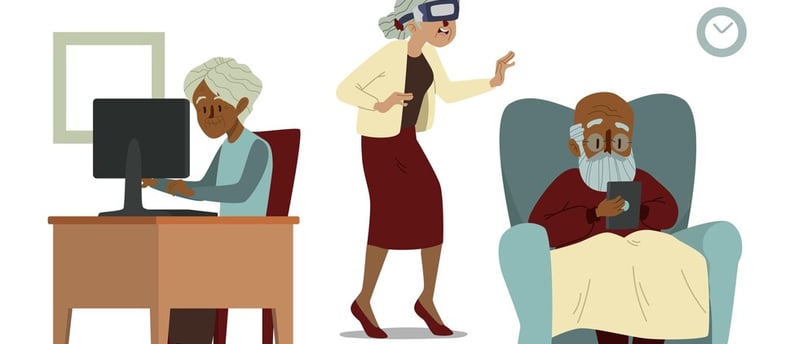The Evolution of Technology in Home Care: Empowering Independence and Enhancing Quality of Life
4/28/20252 min read


The Evolution of Technology in Home Care: Empowering Independence and Enhancing Quality of Life
The landscape of home care has undergone a remarkable transformation over the past few decades, driven by rapid advancements in technology. From basic medical alert systems to sophisticated AI-driven solutions, technology is reshaping how care is delivered, enabling seniors to live more independently and safely in their own homes.
From Reactive to Proactive Care
Traditionally, home care was reactive, focusing on addressing health issues as they arose. Today, technology enables a proactive approach, emphasizing prevention and early intervention. Remote patient monitoring (RPM) systems, for instance, allow continuous tracking of vital signs such as blood pressure, glucose levels, and heart rate. These systems can detect anomalies early, prompting timely medical responses and reducing hospital admissions. Wikipedia+2Branch+2Healthcare IT Today+2Wikipedia
The Rise of Telehealth and Virtual Care
Telehealth has become a cornerstone of modern home care, especially in the wake of the COVID-19 pandemic. Through video consultations and digital communication tools, healthcare providers can assess, diagnose, and treat patients remotely. This not only enhances access to care for those in remote areas but also reduces the need for travel, which can be challenging for the elderly. Mymcso
Smart Home Integration
Smart home technologies are increasingly integrated into home care solutions. Devices such as voice-activated assistants, automated lighting, and smart thermostats can be tailored to meet the specific needs of seniors, enhancing their comfort and safety. For example, motion sensors can detect unusual activity patterns, alerting caregivers to potential issues like falls or wandering.
Artificial Intelligence and Predictive Analytics
Artificial Intelligence (AI) is playing a pivotal role in advancing home care. AI algorithms can analyze data from various sources to predict health trends and potential risks. For instance, AI-powered tools can assess speech patterns and facial expressions to detect early signs of cognitive decline or depression, enabling timely interventions. Latest news & breaking headlines
Virtual Companions and Social Engagement
Loneliness and social isolation are significant concerns for the elderly. Innovations like AI-powered virtual companions offer not only reminders for medication and appointments but also engage users in conversations, games, and cognitive exercises. These companions can provide emotional support and mental stimulation, contributing to overall well-being. New York Post
The Future of Home Care Technology
Looking ahead, we can expect further integration of technology in home care, with developments such as:
Advanced Wearables: Devices that monitor a broader range of health metrics in real-time.
Robotic Assistance: Robots that can assist with daily tasks, mobility, and even companionship.Branch+10Adobe Stock+10IoT Worlds+10
Enhanced Data Security: As more personal health data is collected, ensuring its security and privacy will be paramount.
These advancements promise to make home care more personalized, efficient, and accessible, allowing seniors to age in place with dignity and independence.
At Proper Way Home Care, we are committed to staying at the forefront of these technological advancements, integrating the latest innovations to provide our clients with the highest quality of care. Our membership-based services ensure that your loved ones receive personalized, technology-enhanced support tailored to their unique needs.
For more information on how our services can benefit your family, please contact us.